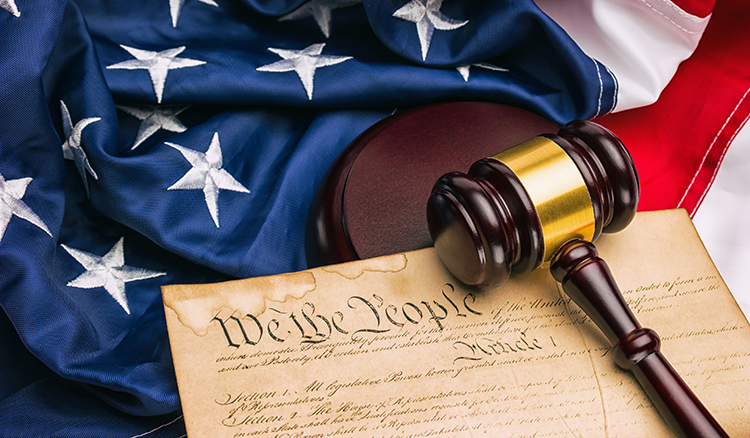Law Students
Law student who argued Constitution protects white people received award for top grade in originalism seminar

A Florida law student won an award after arguing in a paper that the United States was conceived as a white country, and federal courts “have the power to arrest the dispossession of white America.” (Image from Shutterstock)
Updated: A Florida law student won an award after arguing in a paper that the United States was conceived as a white country, and federal courts “have the power to arrest the dispossession of white America.”
The student, Preston Damsky, won the book award for the best student in his originalism seminar at the University of Florida Levin College of Law, the New York Times reports in a story noted by the TaxProf Blog.
U.S. District Judge John L. Badalamenti of the Middle District of Florida was a co-teacher of the seminar.
The paper constituted 65% of the final grade, according to a Volokh Conspiracy post by Josh Blackman, a professor at the South Texas College of Law in Houson, who said Badalamenti, a former public defender, was being unfairly targeted in the article.
“The fact that a student received a high grade in a small seminar is not worthy of a New York Times expose,” Blackman wrote. “Aren’t there actual problems to write about?”
Damsky’s paper argued that courts should challenge the constitutionality of the 14th Amendment—which protects due process, equal protection and birthright citizenship—as well as the 15th Amendment—which says the right to vote cannot be denied based on race or status as a former slave.
Failure to stop the dispossession of white America is “at best, judicial surrender in the face of a terrible crime,” Damsky’s paper said. “The people cannot be expected to meekly swallow this demographic assault on their sovereignty.”
Merritt McAlister, the interim dean at the University of Florida Levin College of Law, defended the award decision in at least two town hall meetings and in an email to students, citing the need for institutional neutrality and Damsky’s free speech rights, according to the New York Times. That was before Damsky began posting “blunt, crass and ugly” messages on X (formerly Twitter), including one saying Jewish people must be “abolished by any means necessary” and another saying immigrant “invaders” should be “done away with by any means necessary,” according to the article.
Damsky was suspended and barred from campus, decisions that he is challenging. The university told Damsky in emails that his posts made students fear for their safety.
Damsky told the New York Times that he isn’t a threat.
“You know,” he said, “I’m not, like, a psychopathic ax murderer.”
He also said he was being unfairly targeted for his views.
He did say, however, referring to him as a Nazi “would not be manifestly wrong,” the article says.
Badalamenti, an appointee of President Donald Trump during his first term, has received praise from liberals and conservatives, the New York Times reports. Badalamenti “is not a white nationalist,” Damsky told the New York Times.
“Don’t get me wrong,” Damsky said. “I would prefer it if he was.”
In his Volokh Conspiracy post, Blackman said Badalamenti is held in high regard. Blackman read the paper and said he would have given it a grade of B-plus or an A-minus “if I was feeling generous.”
“Is this the best student note I’ve ever read? No,” Blackman wrote. “Was it executed well from a technical perspective? Yes. Was it thoroughly researched? Yes. Did it present a coherent thesis based on history? Yes. Was it well organized? Not really. The article underdeveloped the core obstacle—the ratification of the Reconstruction Amendments—and doesn’t explain how the Supreme Court would overrule certain landmark precedents. But these sorts of shortcomings are typical of law student papers.”
Writing at Bluesky, Anthony Michael Kreis, a professor and a historical political scientist at the Georgia State University College of Law, had a different impression.
“I read the paper. It’s bad,” he wrote. “It’s just Dred Scott repackaged. No new historical research. No innovative argument. It isn’t poorly written, but that’s about the only thing I can say about it—certainly could not have been the best paper in the class.”
McAlister issued a statement to the University of Florida community, reprinted at the Volokh Conspiracy, after the New York Times published its article.
“Let me state unequivocally: The student’s views are revolting and do not reflect the values of UF Law, its faculty or its administration,” McAlister said.
“The paper’s views also in no way reflect the views of the professor in this course. The professor had no knowledge of this student’s history at the law school or his deeply held personal views,” McAlister said. “The professor took the paper on its face—as a student paper attempting to use originalist methodology to reach a detestable and extreme position. As abhorrent as the paper’s thesis may be, that work still falls within the bounds of academic freedom and the First Amendment, and, as such, was graded consistent with the grading standard for the course. … I know that many of you are outraged at the law school for not taking the book award away from the student. But the administration does not second-guess grading decisions at the law school, except in very narrow circumstances, and those circumstances did not apply here. … Rescinding the honor might feel righteous, but it would betray those principles and set a dangerous precedent in a law school that trains students to confront unpopular ideas and represent unpopular clients.”
Updated June 25 at 8:04 a.m. to include Merritt McAlister’s latest statement.
Write a letter to the editor, share a story tip or update, or report an error.

